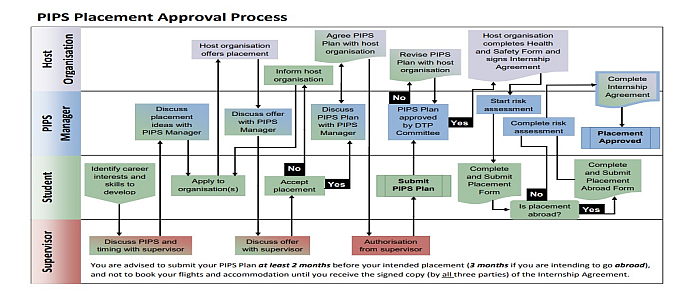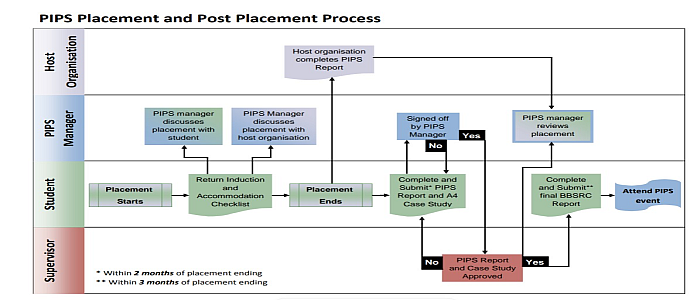Information for PIPS Host Organisations
PIPS is a 3-month internship that is a significant and mandatory component of the NorthWestBio Doctoral Training Partnership (DTP) programme. The main purpose of PIPS is to provide PhD students with non-academic work experience, equipping them with transferable skills relevant to a variety of career paths. This exposure enables early-career researchers to see how their research fits into broader contexts and discover potential professional avenues outside of academia.
How is a PIPS Organised?
The PIPS process is designed to be student-led, meaning students are responsible for organising and planning their own placements. With guidance from their University PIPS Contact, students are encouraged to independently seek out placements that match their interests and career goals. They can either approach organisations that have previously hosted PIPS students or explore new organisations interested in joining the programme.Typically, students complete their PIPS during the second or third year of their 4-year PhD program.
What Type of Internship Makes A Suitable PIPS?
All PIPS placements must meet the following criteria:
- Unrelated to the student’s PhD research project: Placements should provide an opportunity to explore fields distinct from the student’s current research focus.
- Outside of academia: Roles within academia or research institutes are generally unsuitable, even if unrelated to the PhD topic. However, if a role offers a distinctly different experience and involves the development of non-lab, transferable skills, it may be considered for PIPS.
- Challenging and relevant: Placements should offer tasks and responsibilities at a level that will challenge and engage a PhD student, supporting the development of transferable, work-related skills.
A PIPS placement should offer students a defined project with clear, measurable outcomes, designed to provide professional experience beyond their direct research environment. Suitable projects could take many forms, including:
- Conducting an applied research project within industry
- Overseeing a non-research project in a professional setting
- Assisting in research administration or grant management
- Developing policy for government or research councils
- Executing a marketing initiative for an organization
- Engaging in science communication through outreach programs
- Contributing to the development of a new product or service for a company
Placements can be undertaken in various sectors, such as industry, education, policy, media, consultancy, or knowledge exchange, providing students with invaluable exposure to career opportunities outside academia and supporting the development of practical, transferable skills.
Duration of Internships
PIPS placements are structured as 3-month internships to ensure students gain sufficient experience outside of their research environment while also enabling host organisations to complete a substantial project. Typically, students undertake their PIPS placements towards the end of Year 2 or the beginning of Year 3 of their 4-year PhD, balancing their commitment to both research and internship without prolonged disruption.
The internship can be completed in a single 3-month block, divided into shorter blocks, or on a part-time basis over an extended period, depending on the needs of the student and host. Additionally, placements can be split across multiple host organizations if the project warrants it.
Preparation requirements prior to the internship are minimal, and students are generally not expected to exceed a normal full-time workload during their PIPS placement, allowing for a focused yet balanced experience.
PIPS Funding
PIPS students are fully funded through their BBSRC maintenance stipend during their placement, meaning they do not require a salary from their host organisation. Additionally, students can claim up to £1,000 from the DTP for reasonable travel and accommodation costs.
However, in cases where expenses exceed this allowance, we ask host organisations to consider a voluntary contribution of up to £2,000 to help cover these additional costs, if feasible. While we understand that not all hosts can make this contribution, we greatly appreciate it from those who can, as it helps ensure the placement remains accessible to all students. In return, hosts receive valuable input from a high-caliber PhD intern, whose contributions and project work provide meaningful returns on this support.
Paperwork
The flowcharts below illustrate the steps and paperwork requirements for PIPS, coordinated by the PIPS Administrator. This includes:
Pre-Approval Documentation
- The host organization collaborates with the PIPS administrator to provide the PIPS Plan, detailing project scope, objectives, and supervisory details.
Placement Approval
- The PIPS Administrator reviews and coordinates approval with the Executive Committee, ensuring alignment with program guidelines.
Post-Approval Requirements
- Once approved, any remaining agreements, such as health and safety forms, Internship Agreement, and contact details for periodic check-ins, are finalized between the host, the student, and the PIPS Administrator.
Reporting
- Once internship is complete, the Host organisation will need to complete PIPS Report.



